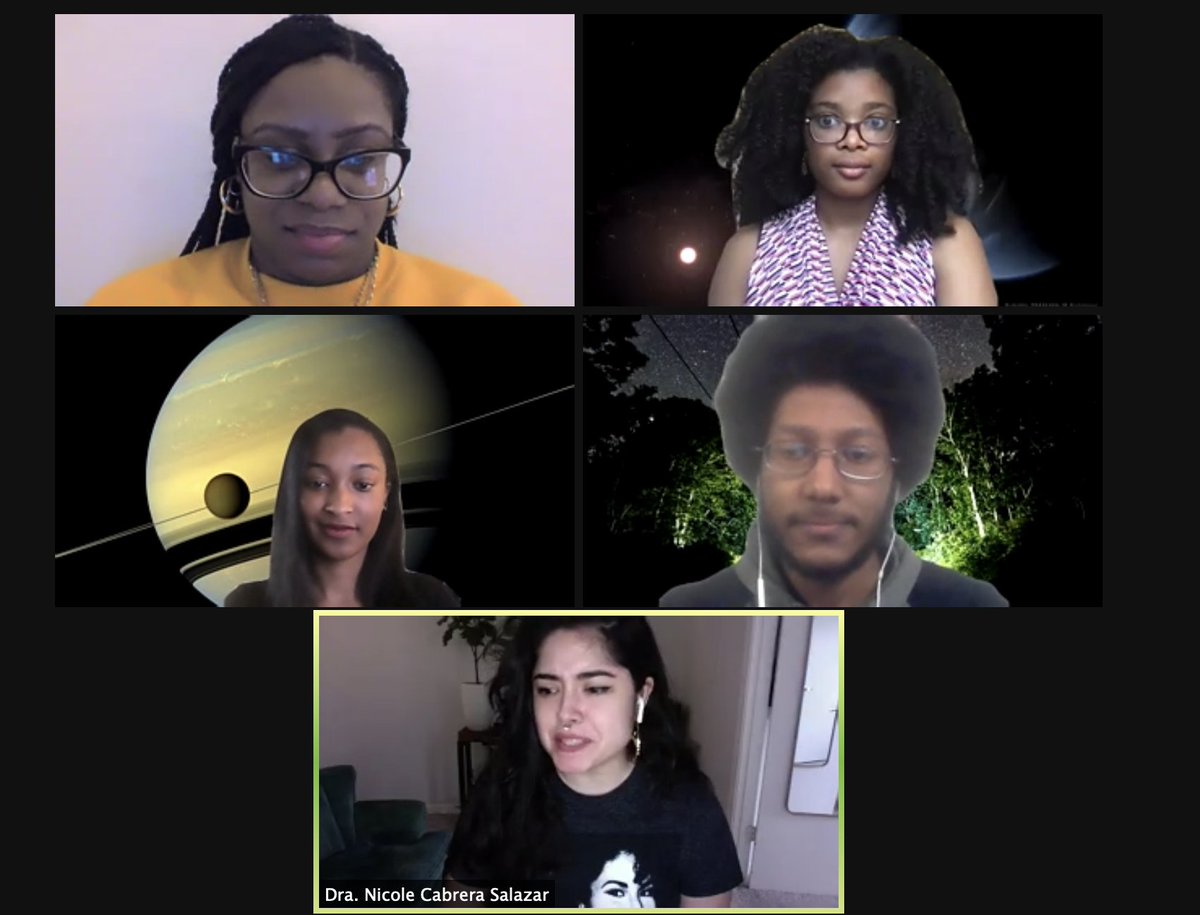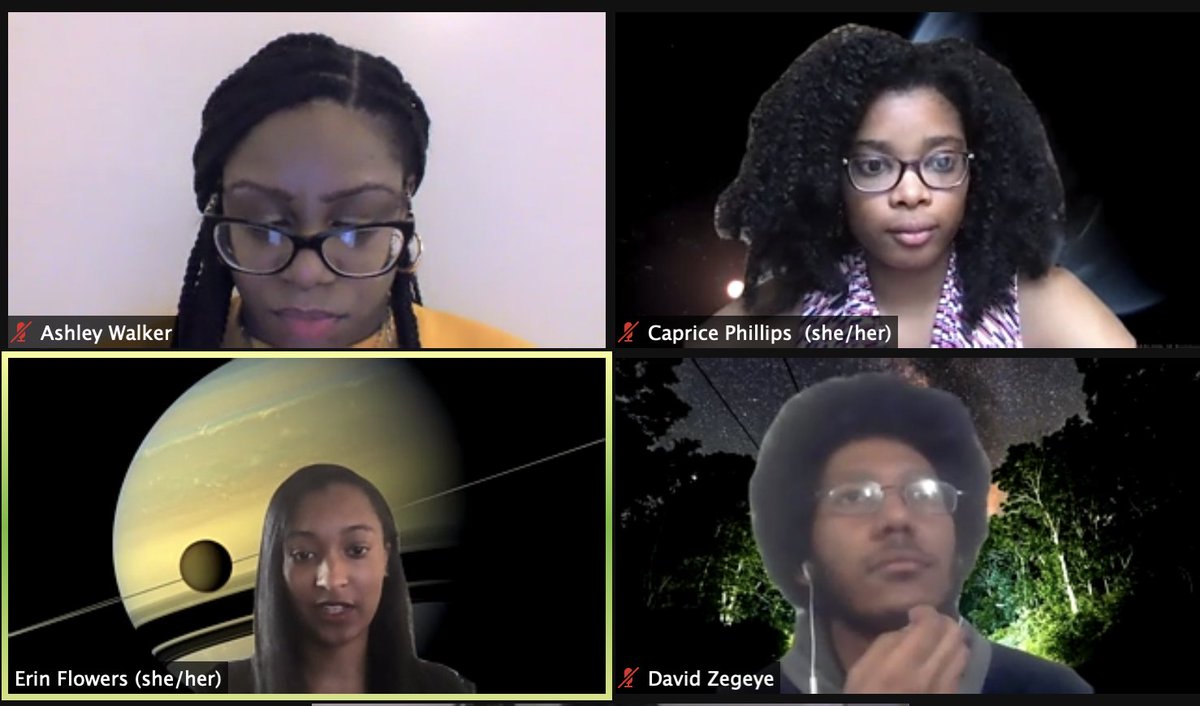Next up, we're covering Special Session 107:
The CSMA Panel: A Discussion on Anti-Blackness in Astronomy
Featuring @That_Astro_Chic @CapricePhillips @DavidZegeye and Erin Flowers, and moderated by @jazztronomy
The CSMA Panel: A Discussion on Anti-Blackness in Astronomy
Featuring @That_Astro_Chic @CapricePhillips @DavidZegeye and Erin Flowers, and moderated by @jazztronomy
First topic: What Black scientists inspired you to go into astronomy?
@neiltyson @JedidahIslerPhD @maejemison all among the answers.
Having tutors in college, and family members with degrees in science were also very important!
@neiltyson @JedidahIslerPhD @maejemison all among the answers.
Having tutors in college, and family members with degrees in science were also very important!
Next topics: What does it mean to be Black in America and Black in Astronomy?
@That_Astro_Chic points out that as a Black astronomer, you can't separate being Black and being an Astronomer.
Erin talks about regretting not being able to name more Black scientists as role models and wanting to be that role model she wishes she had, and that there are not many Black women astronomers in particular.
Both @CapricePhillips and @DavidZegeye point out being a Black astronomer means being both invisible and hyper-visible at the same time.
(hyper-visibility is "heightened scrutiny, see e.g. https://www.sciencedirect.com/science/article/abs/pii/S000187911830068X)
(hyper-visibility is "heightened scrutiny, see e.g. https://www.sciencedirect.com/science/article/abs/pii/S000187911830068X)
Also, @DavidZegeye points out needing to mentor Black students in other science departments because there are also few Black students not just in astro
@That_Astro_Chic points out the need for Black students to have Black mentors (which can be hard to find with so few Black astronomers), and she's thankful for having two great Black mentors in particular: Nia Imara and Lynnae Quick!
Next topic: What does Anti-Blackness in Astronomy mean to you?
@That_Astro_Chic notes that when asked about "Why are there so few Black astronomers?", astronomers can be too quick to blame Black astronomers and students for that when we should instead be asking that question ourselves and really trying to figure out why.
@DavidZegeye notes that his institution (the University of Chicago) is in a very segregated neighborhood, and that it's easier for members of the department to visit the South Pole than visit the South Side of Chicago.
Next topic: Are you excited about @BlackInAstro and the other BlackInScience movements (like @BlackInChem, etc.)?
@CapricePhillips says she's excited to have the opportunity to share what she works on! And that it's great to see all of the other Black astronomers, that "we're not alone", and that others are facing and trying to overcome similar issues.
@DavidZegeye points out the importance of Black astronomers being able to take ownership of astronomy --- and @BlackInAstro provides that!
Next topic: The small (only double-digit!) number of Black astronomers (and Black women astronomers) with PhDs.
@DavidZegeye points out that if you are a Black student (or a Black woman in particular), not having the best grades are more likely to be used as an excuse for professors to tell you astronomy isn't for you and for professors to encourage you to leave the field.
@That_Astro_Chic points out that some mentors don't know how to mentor Black students.
She says "It's okay [for a mentor] to say 'I don’t know how to mentor Black students.'!!"
That's much better than ignoring that issue and not trying to find a solution.
She says "It's okay [for a mentor] to say 'I don’t know how to mentor Black students.'!!"
That's much better than ignoring that issue and not trying to find a solution.
Next topic: What does white privilege mean to you?
@CapricePhillips points out the issue of white fragility, and the thought that "[the few Black astronomers] is not my problem to fix."
@That_Astro_Chic notes it can be an issue to think "I can't be racist" just because e.g. you have Black friends.
Erin notes that there is often too much resistance to having these meetings on improving the situation for Black astronomers. (e.g. the thought of "Why do we need to have these meetings?", and getting defensive when told why).
Next topic: Why do you think non-Black astronomers don’t take ownership of these types of issues?
Erin says astronomers should take the time to look up solutions to not knowing e.g. how to mentor Black students. The internet is a great resource!
(It is your responsibility to know how to mentor students as a faculty member!)
(It is your responsibility to know how to mentor students as a faculty member!)
Erin also says there's a lot of inertia:
Once you get around to admitting you need to be better, you can't stop there. You need to figure out how to be better.
Once you get around to admitting you need to be better, you can't stop there. You need to figure out how to be better.
Next topic: What does Black astronomy look like to you in the future?
Erin notes that we should work to decentralize the Western narrative of how science needs to be done, and that we need to develop a multicultural approach.
Onto questions!
First question is on how to solve structural barriers.
Erin points out the need to rethink the tenure system to solve the issues of having e.g. mostly or all-male faculty that are not very diverse.
@CapricePhillips notes not to think of Black astronomers as filling a checkmark (and not to think how do Black faculty, etc. benefit white astronomers). In spite of that, there's also the issue of just using white women to fill that checkmark.
Next question is on how to take the initiative to come up with solutions.
@CapricePhillips points out it's "not my job" to be there when discussing solutions. (It’s exhausting to be in that process!)
@jazztronomy notes that these issues were not created by Black people in astronomy.
Next question is about "I don’t feel I have power as a graduate student."
@That_Astro_Chic notes that you should always be able to stand up for Black students.
And that if your department has a call to action to approach these issues, that's your chance to make a difference!
And that if your department has a call to action to approach these issues, that's your chance to make a difference!
Next question: "Has anyone done a good job of solving these issues?"
@That_Astro_Chic points out the most straightforward thing:
Hire Black people! (as faculty and grad students)
Also notes the importance of having all-Black panels like this one.
Hire Black people! (as faculty and grad students)
Also notes the importance of having all-Black panels like this one.
@DavidZegeye emphasizes the importance of working with students in the process.
Erin notes that we will need to wait a couple of years to really know if DEI work has produced results.
@CapricePhillips says that if you really don't know what to do, there are outside consulting options (like @moveboldly Movement Consulting, which is run by @jazztronomy!)
@That_Astro_Chic also says that a key measure is making sure Black people don't leave the field.
Last question is on what to do at the undergraduate level.
Erin & @CapricePhillips note: Don’t wait for students to come to you with questions about opportunities. You should already be telling your students about opportunities.
And that they were unaware of opportunities or had to figure them out through undergrads telling each other.
And that they were unaware of opportunities or had to figure them out through undergrads telling each other.
@That_Astro_Chic notes the importance of getting students to believe in themselves, and in particular to get them to believe that they can take the next step (e.g. not to think "I did undergrad, that's enough, now I'm done.")
@That_Astro_Chic also says that you should point out not just opportunities that are available, but also resources that are available!
Beyond that, @That_Astro_Chic also notes the issue of "Black Exceptionalism":
Don't disregard a Black student with much lower grades in favor of a Black student with much higher grades.
Treat them equally. Your goal should be for both of them to succeed!
Don't disregard a Black student with much lower grades in favor of a Black student with much higher grades.
Treat them equally. Your goal should be for both of them to succeed!
That's it for questions! Thanks to all of the panelists for taking their time to share all of this with the community!

 Read on Twitter
Read on Twitter



